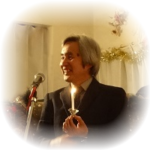↓Audio link to the sermon:(1st worship recording)
(If you can’t listen on your iPhone, please update your iOS)
In our series on the book of Mark, we recently looked at Jesus’ parables. Now we begin a new section, in which Jesus authenticates his teachings and identity as God’s Son through his miraculous power. He has power over nature, demons, sickness, and death. For today, we will look at Jesus’ power over the nature, in Mark chapter 4. Let’s pray.
Mark 4:35-36
We’ll read Mark 4:35-41. Starting with verses 35-36: On that day, when evening had come, he said to them, “Let us go across to the other side.” And leaving the crowd, they took him with them in the boat, just as he was. And other boats were with him.
Here, Jesus just finished teaching a large crowd through parables. He was teaching from a boat anchored near the shore (4:1). When evening came, he tells his disciples to cross to the other side of the lake, towards a predominantly Gentile territory (5:1).
Here, Jesus is making his first move into a Gentile area, which he will repeatedly go to (6:45, 7:31, 8:13). This reveals the heart of Jesus to expand the kingdom of God beyond his ethnic group.
Mark 4:37-38
Next, in verses 37-38, we read about the storm. And a great windstorm arose, and the waves were breaking into the boat, so that the boat was already filling. But he was in the stern, asleep on the cushion. And they woke him and said to him, “Teacher, do you not care that we are perishing?”
The Sea of Galilee is known for its violent gales that can come suddenly—a danger for small fishing vessels like the boat Jesus and his disciples are on. The waves are so strong that they threatened to sink the boat. Yet, despite this Jesus was asleep.
Jesus had just finished a long day of teaching—and in fact a long week of activity. His exhaustion shows that he is just as human as his disciples. Just last month, we celebrated Christmas—the coming of God in the flesh. Jesus, though divine in nature, shares our human nature.
As tired as Jesus was, his precious sleep ended when the disciples woke him up saying, “Teacher, do you not care that we are perishing?” How often we too ask God: Do you not care about what is happening? Why aren’t you doing something to help?
Mark 4:39-41
Moving on to verses 39-41. And he awoke and rebuked the wind and said to the sea, “Peace! Be still!” And the wind ceased, and there was a great calm. He said to them, “Why are you so afraid? Have you still no faith?” And they were filled with great fear and said to one another, “Who then is this, that even the wind and the sea obey him?”
Jesus does not pray to God to calm the storm. He simply rebukes it, as he would the demons in previous chapters of Mark’s gospel. This miracle may have reminded the disciples of Psalm 107, which says, “Then they cried to the Lord in their trouble, and he delivered them from their distress. He made the storm be still, and the waves of the sea were hushed” (v28-29).
Only God has the power over the seas (Psalm 65:8, 89:10, Job 38:8). So, naturally, the disciples were filled with great awe. They asked, “Who then is this, that even the wind and the sea obey him?” Just a little earlier, they were terrified of the storm. But now, in the presence of Jesus who calmed the storm, they were filled with reverent fear of him.
After calming the storm, Jesus poses a question, “Why are you so afraid? Have you still not faith?” I do not think that Jesus was necessarily scolding the disciples for being afraid.
It is a totally normal human experience to feel afraid when you are about to die! Even Jesus in the Garden of Gethsemane before his crucifixion went through a terrifying moment. Luke records for us in chapter 22:44, “And being in agony he prayed more earnestly; and his sweat became like great drops of blood falling down to the ground.” Jesus had perfect trust in his Father, and yet he was still affected by his human emotions of dread and fear of pain.
Fear can make us question our beliefs. It is not wrong to be afraid or to doubt per se. Fear keeps us from touching a fire; doubt keeps us from getting tricked by conmen. But when fear prevents us from doing what is right or makes us stop believing in God’s goodness, it becomes a harmful and negative force.
I believe Jesus wanted his disciples to see that their fate did not lie in the hands of the storm, but in the hands of God. Nature may be a terrifying force, but God is the Lord of all Nature. He is in control.
When Jesus asked “Why are you so afraid? Have you still no faith?” he was saying, “Do you really believe God is almighty? Do you believe he cares for you?”
Having faith is not the absence of fear. It is a decision to look at God and choose to believe what He has said.
One Bible scholar said, “It takes great faith to trust the sleeping Jesus, to know that He cares and works for us even when it does not seem like it. But this is the kind of trust God wants to build in us.”
Personal Story about Fear
I would like to share about how God spoke to me about fear recently. I went through a dark moment after my mother’s death in August.
I thought, “If mom’s death was this painful, then I cannot bear to face another death. What if my wife or daughter dies suddenly? Or my father, or one of my mentors? How would I cope with the pain of that?” Each day, I someone dying and began to feel terrified, until I found it hard to sleep at night.
And beneath all this was another thought: “If God is so good or powerful, then why does he allow suffering to exist?” I found it hard to trust that God was truly good and that he cared for me.
In a sense, it was good that my faith was shaken by fear. It made me realize that I actually expected God to protect me from suffering and pain. But will God do that all the time? Jesus himself says in John 16:33, “In this world, you will have tribulations.” Even Paul in 2 Corinthians 1:8 says, “For we do not want you to be unaware, brothers, of the affliction we experienced in Asia. For we were so utterly burdened beyond our strength that we despaired of life itself.” God never promised that the life of the believer will always be smooth sailing. Sometimes, we go through storms and even shipwrecks in life.
I began to find footing in my faith again after rediscovering the God of the Bible. I found fresh encouragement when reading Psalm 23:4, “Even though I walk through the valley of the shadow of death, I will fear no evil, for you are with me; your rod and your staff, they comfort me.” While he does not promise that my life will be free of future sufferings, in Deuteronomy 31:8 he promises that he will not leave nor forsake me.
One evening, just right after sunset, I took my 3-year-old daughter to the park. A motorcycle gang member (暴走族) came riding around the park, revving his engine furiously loud. My daughter was terrified of the loud sound and began crying hysterically. I held her tightly, telling her, “I am here. You don’t have to be afraid.” But no matter how tightly I hugged her and assured her that everything would be all right, she refused to be comforted. The fear had taken over her completely to the point that she could not recognize that she was safe in my arms.
God may not always remove or prevent the things we fear. But he will embrace us when those things are happening.
In the future, I will face the death of a loved one again. I expect it to be painful. But I can look at fear and not allow it to paralyze me, because I can trust the God of the universe to hold my hand when it’s time to face my fears.
There is an expression that goes something like this, “Everything will be okay in the end. If it’s not okay, it’s not the end.” As Christians, we believe this is the end of the story: that God will make everything right again in the New Heavens and Earth. There will no longer be any sadness, suffering, or death. We patiently wait for that day while living in a world filled with turbulent storms.
Conclusion
Christians in Malaysia often sing a hymn called, “Turn Your Eyes Upon Jesus.” The lyrics of the chorus go like this:
Turn your eyes upon Jesus,
Look full in His wonderful face,
And the things of earth will grow strangely dim,
In the light of His glory and grace.
We often sing just the chorus, but I think the first stanza is very relevant to the theme of our message today:
O soul, are you weary and troubled?
No light in the darkness you see?
There’s light for a look at the Savior,
And life more abundant and free.
Even when it is very dark, there will be enough light to see the face of Jesus. Even when it’s too dark to find him, He can see well enough to hold you. In your blindness you may still stumble, but he will guide you through the dark.
Let’s pray. Most loving Father, whose will it is for us to give thanks for all things, to fear nothing but the loss of you, and to cast all our care on you who care for us: Preserve us from being controlled by faithless fears and worldly anxieties. May storm clouds never hide the light of your never-ending love, which you showed us in your Son Jesus Christ our Lord—who lives and reigns with you, in the unity of the Holy Spirit, one God, now and for ever. Amen.
(If you can’t hear from the bar above, click the blue button)
iPhone





 日本語
日本語